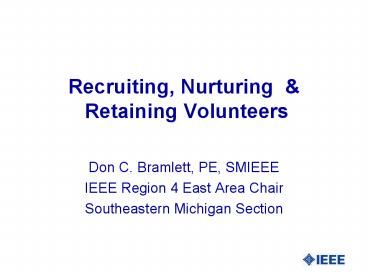Recruiting, Nurturing - PowerPoint PPT Presentation
1 / 20
Title:
Recruiting, Nurturing
Description:
45% of all American men and 52% of all American women ... Be a coach and cheerleader. Mentor and counsel, as needed. Fire a volunteer, if necessary ... – PowerPoint PPT presentation
Number of Views:63
Avg rating:3.0/5.0
Title: Recruiting, Nurturing
1
Recruiting, Nurturing Retaining Volunteers
- Don C. Bramlett, PE, SMIEEE
- IEEE Region 4 East Area Chair
- Southeastern Michigan Section
2
Who is Volunteering
- 49 of American adults volunteered 1995
- Over 50 of American between 25 and 54 years old
- 45 of all American men and 52 of all American
women - Increases with education attained, over 70 of
college graduates volunteered an average of 4.8
hours a week - Increases with household income, 69 with income
over 100,000
3
Type of Organizations
- People are most likely to volunteer
- Charitable and community service projects
- Want to make a difference
- Want to help to solve a problem
- Many trade and professional organizations find
- Difficult to compete for their members volunteer
time - Volunteer numbers diminishing
4
Reference Resource
- Volunteers How to Get Them, How to Keep Them
- By Helen Little
- Panacea Press, Inc.
- Naperville, IL 1999
5
Needs of a Volunteer
- A specific manageable task with a beginning and
an end - A task that matches the interests and reasons for
volunteering - A good reason for doing the task
- Written instructions
- A reasonable deadline for doing the task
6
Needs of a Volunteer
- Freedom to complete the task when and where it is
most convenient for the volunteer - Everything necessary to complete the task without
interruption - Adequate training
- A safe, comfortable and friendly working
environment
7
Needs of a Volunteer
- Follow-up to see that the task is completed
- An opportunity to provide feedback when the task
is finished - Appreciation, recognition and rewards that match
the reasons for volunteering
8
A Specific Manageable Task With a Beginning and
an End
- Specific Roles - Written Job Descriptions,
Instructions and/or Work Directions - Skills Knowledge Experience
- Responsibilities - Duties
- Time Commitment - Schedule
- Making the Appeal
- Ask for help personally
- Personal contacts, Meeting attendees, etc
9
A Task That Matches Interests and Reasons for
Volunteering
- Volunteer motivations
- Affiliation Power - Recognition
- Professional Growth - Networking
- Determine volunteer interest
- Polls Surveys
- Interview volunteers
10
A Good Reason For Doing the Task
- Work or task should be important to the
functioning of the organization - Volunteer must feel he/she is making a meaningful
contribution - Will lead to a greater level of commitment to the
task
11
Written Instructions
- Job Description
- Work Directions
- Detailed Instructions
- Letters of appreciation and thanks
12
A Reasonable Deadline for Doing the Task
- Establish a schedule, interim milestones and
deadline for completion of a task - Mentor and follow-up with the volunteer on
progress to completion of a task
13
Freedom to Complete the Task When Where It Is
Most Convenient for the Volunteer
- Avoid time-consuming and wasteful meetings
- Make use of conference calls and communication
technologies - Provide the volunteer flexibility
- Monitor progress of the volunteer
14
Needs Everything Necessary to Complete the Task
Without Interruption
- Plan the work and work the plan
- Provide the materials and info
- Increase the probability of success
- Mentoring and support needed
15
Adequate Training
- Match training to the experience, needs and
duties of the volunteer - Offer alternatives for training
- Mentor and monitor volunteers
- Annual Section Chapter training
16
A Safe, Comfortable and Friendly Working
Environment
- Meeting locations need to be safe, secure and
convenient - Volunteers need to feel welcome and valuable
members of the team - Mentor and monitor volunteers
- Provide for special needs
- Volunteers will have a more positive image of the
organization
17
Follow-up to See That the Task Is Completed
- Volunteers are colleagues partners, not
subordinates or employees - Give opportunity to perform
- Monitor and provide feedback
- Be a coach and cheerleader
- Mentor and counsel, as needed
- Fire a volunteer, if necessary
18
Opportunity to Provide Feedback When the Task Is
Completed
- Solicit feedback from volunteers
- Volunteers value the opportunity
- Lessons learned opportunity
- Learn about problems encountered
- Prevent potential problems in the future and loss
of volunteers
19
Appreciation, Recognition and Rewards That Match
the Reasons for Volunteering
- One of the easiest and least expensive needs of a
volunteer - Thank each volunteer personally
- Publicly recognize volunteers, as appropriate
- Provide a position with more authority and
responsibility
20
Long Term Benefits
- Meeting volunteer needs creates a winwin
situation - Volunteers benefit when you understand and meet
their needs - The organization benefits too
- A more successful organization
- More long-term productive volunteers more
active members































